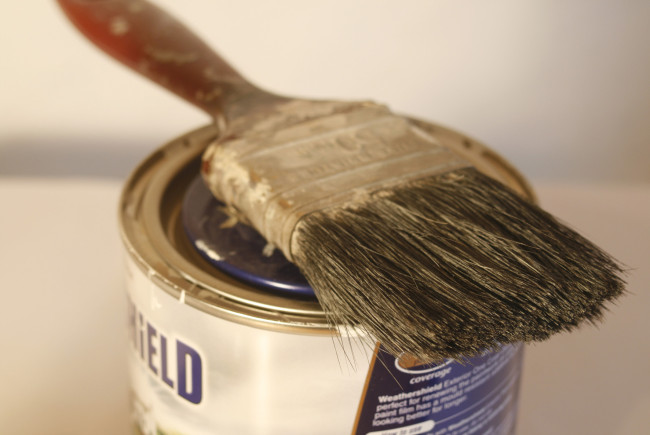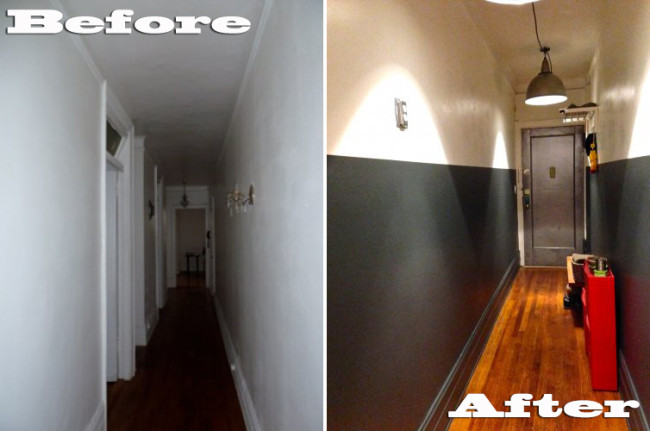Everything you need to know about painting your NYC rental

Whether you're moving to a new place or just want to spruce up your own place, you may be considering adding a fresh coat of paint to your rental.
In fact, we field paint-related questions all the time—if renters have to do it, or the landlord does, and what the ramifications are if nobody takes care of it. So to all of the paint-befuddled, here goes:
To start, in New York, there are a few key rules when it comes to painting rental apartments, according to city code.
- If you paint a wall in your rental any color other than white, you'll have to repaint before you move out, or the landlord can withhold the security deposit. (City code also mentions "wallpaper or other acceptable wall covering" as viable options but in NYC rentals, we've only ever seen paint.)
- The landlord in a multiple-dwelling building (in other words, a place with three or more apartments) is required to paint or otherwise update your wall coverings at least once every three years, though this often goes unenforced, and isn't a strict requirement if both you and your landlord agree to postpone the paint job.
- If the walls become somehow "unsanitary" while you live there, you may be required to repaint yourself, unless you can prove to the Department of Housing Preservation and Development that the damage wasn't caused by you (or your roommates or guests), but by neglect on the landlord's part.
- In common spaces like hallways, lobbies, etc., the landlord is also obligated to paint or wallpaper the walls, but only "whenever necessary in the judgment" of the Housing department, not every three years.
Seems simple enough, but often, these rules don't account for the entire story. With help from Sam Himmelstein, a landlord-tenant lawyer (FYI: a Brick Underground sponsor), we answered some reader questions on some of the more distinctive painting issues out there.
MY LANDLORD HASN'T PAINTED IN YEARS. SHOULD MY RENT GO DOWN?
The problem:
"I moved into my rent-stabilized apartment in September 1993. In that time, my landlord has painted my apartment twice, but refused to paint the outside of my door. I'm approaching the 21st anniversary of my move-in date, and therefore, I should be approaching my seventh paint job. Since it's been much less than that, am I entitled to any rental rebate, rollback, etc.?"
The solution:
While paint jobs every three years are, indeed, a required service for your rent-stabilized apartment, you're not likely to see any compensation other than a new paint job or, at most, a temporary reduction in your rent.
If you're currently overdue, you can file a complaint with the Division of Housing and Community Renewal, and if your landlord still doesn't paint after that, your rent could go back to the level from your previous lease, and stay frozen at that price until you get the paint job you've been waiting for.
But note that financial restitution for services your landlord failed to provide "are only retroactive to the day you filed your complaint," Himmelstein explains. "You can't get a rollback for any time prior to the date that you file. That, and the city's six-year statute of limitations for rent rollbacks mean that even if you do get a reduction, don't expect rent to plummet to what you paid back in 1993.
Similarly, you may get a break on rent if the paint is chipping, peeling, or otherwise in so much disrepair that it violates the warrant of habitability, as opposed to just being an aesthetic issue. But that's not necessarily the most practical route to go.
"If you came to me, I'd say not to seek compensation," says Himmelstein. "It would be a very small amount, and you'd have to show that the paint job reduced the value of the apartment or posed a serious health or safety issue," which is rarely the case.
As for that front door, according to the same city code that requires your once-every-three-years paint job, "public areas" of a building are up to the landlord's discretion, so you may be fighting a losing battle on that one.
NO LEASE, NO PROBLEM?
The problem:
"I moved into my current apartment on a single floor of a house in September 2008, and have never had a formal lease. The only repair we’ve requested in six years was the replacement of a faucet in the kitchen sink, which the landlord agreed to and paid for. A little over a month ago, we requested a paint job, and the landlord responded that we don’t have a lease and he’s not willing to pay. When I mentioned the law about landlords painting apartments every three years, he told me that I’m being greedy and should be happy to be paying such cheap rent. In the past six years I have paid over $100,000 in rent, and have only asked for one other repair. Do I have any recourse?”
The solution:
You're in the right, but it may be hard to prove it, especially if your building is a home with three units or less, which it sounds like it might be.
"The city code that requires painting applies to buildings with three units or more," says Himmelstein, "And if that's the case, the rule applies, with or without an actual lease."
However, you may want to weigh your options carefully.
"It's technically illegal for your landlord to retaliate" in response to your demands, says Himmelstein, "But that's a very hard right to enforce." You're in an especially precarious position without a formal lease, and your landlord can give you the boot with just 30 days notice. It's unfair, but if you're hoping to hang onto your cheap apartment, this might be a case of choosing your battles.
REPAINT OR PAY UP?
The problem:
“I live in an apartment with four roommates, and we've been tenants for four years. Our management company wants us to paint back our walls before we move out. Could they do this and just not give back our security deposit? Also, if you live in an apartment for over three years, the building is required to repaint your apartment. If this is the case, it seems unnecessary for us to repaint.The building is also not getting new tenants in our unit, and have talked to one of my roommates about gutting the apartment completely. Basically, I just want to know if I'm right to think we shouldn't have to paint, and if I am what can I do to inform them.”
The solution:
Really, a lot of this depends on the paint itself. "In general, if a tenant chooses to paint and does it in colors other than white," says Himmelstein, "the landlord has a right to ask you to restore it to its original color, and the fact that they never painted is moot."
But if your roommate is right and they're trying to gut renovate, there's no reason for the landlord to force you to paint, and your best bet is to leave a paper trail. "Communicate in writing and make a record of what they've asked you, and that you've learned about their renovations," Himmelstein advises. "If they are planning to renovate and still won't give you your security deposit back because you painted, you can either take them to small claims court, or head to the Attorney General's office, which offers mediation for security deposit disputes.
A LITTLE HELP, PLEASE?
The problem:
“The landlord hasn't painted my apartment in over 10 years. When I requested that the apartment be painted, I was told it would only happen if I moved all furnishings to allow the painters access to the walls. As I have a bad back and completely deteriorated shoulders, I asked if someone could help move the furnishings.The landlord refused, saying it's my responsibility and they won't paint if I cannot do it myself. Do I have any recourse?”
The solution:
Looks like in this case, your landlord was right.
"He has no obligation at all" to move furniture or help with other prep, says Himmelstein, only to facilitate the actual paint job. "If you're unable to do it yourself, you'll have to hire someone or have friends come in and help out."
***This post was updated on April 19, 2016. It was originally publised on August 12, 2014.
You Might Also Like




























